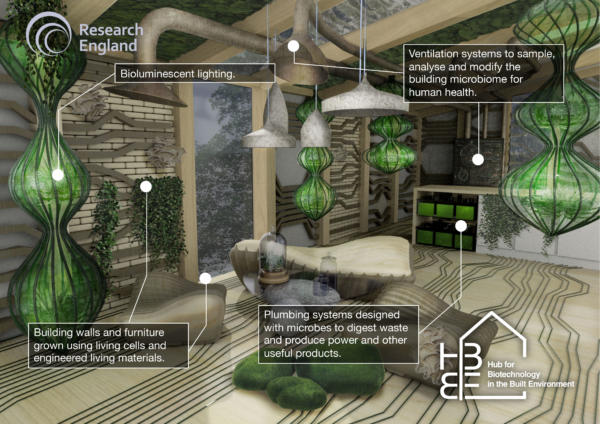World first research hub to create Living Buildings
Experts from Newcastle and Northumbria Universities will develop new technologies to revolutionise how buildings are constructed and how they operate.
The institutions have been jointly awared £8m from Research England's Expanding Excellence in England fund to establish the world's first research Hub for Biotechnology in the Built Environment (HBBE). It will lead to a whole new concept of the way we design and construct our buildings.
Its aim is to create a new generation of 'Living Buildings', which are responsive to the natural environment, grow using living engineered materials, which process their own waste. reduce pollution, generate energy and support a biological environment that benefits health.
Hub Co-Director Dr Martyn Dade-Robertson, a Reader in Design Computation in the School of Architecture, Planning & Landscape at Newcastle University, said: "This is an incredibly exciting opportunity to create a new field of research. By bringing together designers, engineers and bio-scientists, working with industry and investing in state-of-the-art facilities, we are aiming to rethink the building industry."
Hub CO-Director Professor Gary Black, a professor in Protetin Biochemistry, Northumbria University said: "We want to use the very latest biotechnologies to create living homes that are responsive to, and protective of their environment and the people who live in them. The current construction of buildings is unsustainable due to its carbon footprint. The hope would be to use this model in housing in the future."
Universities and Science Minister Chris Skidmore said: "Pushing the boundaries of knowledge and conquering new innovations are what our universities are known for the world over. This programme led by Newcastle and Northumbria Universities will look to create a new generation of homes and offices that consume their own waste and are healthier for people using them.
The Expanding Excellence in England Fund will support projects throughout England to master new and developing areas of research and industry.
Made possible through our record R&D spend delivered by our modern Industrial Strategy, the investment will support researchers to develop solutions and opportunities for UK researchers and businesses."
The HBBE will develop new microbial technologies which will act as a metabolism, processing a building's waste and generating energy. The hub will create living materials, using microbes, and investigate how health environments can be developed by better understanding the way the microbiome of the built environment and humans interact.

The new hub will include The OME, an experimental biological house, which will be built on Newcastle University's campus. A living lab, the OME will be used as an experimental facility to test and and showcase the hub's ground-breaking research.
The HBBE will also comprise a Micro-Design Lab, based at Northumbria University and a Macro Bio-Design Lab at Newcastle University, which will allow the team to develop new technologies from molecules up to buildings.
The HBBE will offically launch on the 1 August 2019. It is currently recruiting 22 new staff and will be led by a multi-disciplinary team across both universities; Dr Martyn Dade-Robertson (NCL), Professor Rachel Armstrong (NCL), Professor Gary Black (NU), Dr Ben Bridgens (NCL), Dr Meng Zhang (NU) and Dr Darren Smith (NU).
